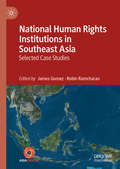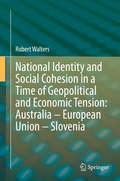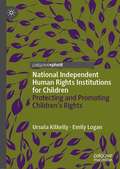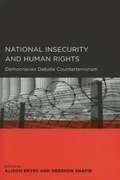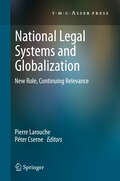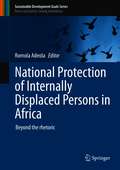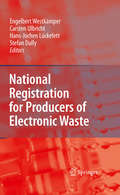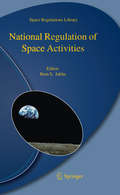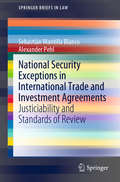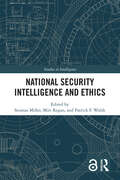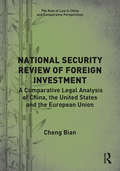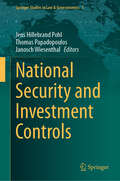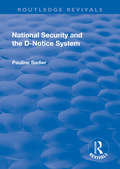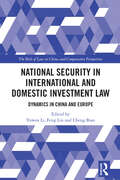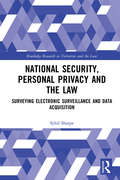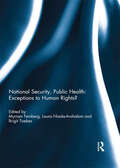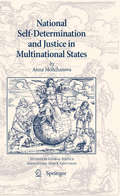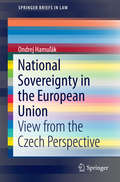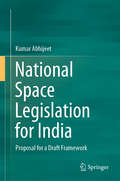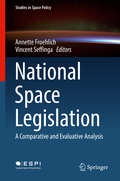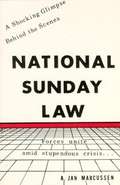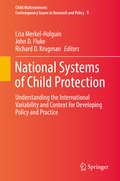- Table View
- List View
National Human Rights Institutions in Southeast Asia: Selected Case Studies
by Robin Ramcharan James GomezThis book reviews Southeast Asia’s National Human Rights Institutions (NHRIs) as part of an emerging assessment of a nascent regional human rights architecture that is facing significant challenges in protecting human rights. The book asks, can NHRIs overcome its weaknesses and provide protection, including remedies, to victims of human rights abuses? Assessing NHRIs’ capacity to do so is vital as the future of human rights protection lies at the national level, and other parts of the architecture—the ASEAN Intergovernmental Commission on Human Rights (AICHR), and the international mechanism of the Universal Periodic Review (UPR)—though helpful, also have their limitations. The critical question the book addresses is whether NHRIs individually or collaboratively provide protection of fundamental human rights. The body of work offered in this book showcases the progress of the NHRIs in Southeast Asia where they also act as a barometer for the fluid political climate of their respective countries. Specifically, the book examines the NHRIs’ capacity to provide protection, notably through the pursuit of quasi-judicial functions, and concludes that this function has either been eroded due to political developments post-establishment or has not been included in the first place. The book’s findings point to the need for NHRIs to increase their effectiveness in the protection of human rights and invites readers and stakeholders to find ways of addressing this gap.
National Identity and Social Cohesion in a Time of Geopolitical and Economic Tension: Australia – European Union – Slovenia
by Robert WaltersThis book aims to enrich the thinking and discussion in relation to the importance that citizenship, immigration, rights and private laws play in the modern world. This is in a time when social cohesion and national identity is being challenged. It will explore the impact these laws have had on Australia, European Union (EU) and Slovenia. Identity and social cohesion are contested concepts and can invoke different responses. The challenges states and the EU are likely to face in retaining and even strengthening their respective identities and social cohesion from continued geopolitical shocks, security, economic volatility and environmental degradation is likely to be formidable. These alone pose some of the most complex political and policy issues facing the world. The EU can be held up as a polity that, has developed an identity and level of cohesion, while allowing member states to retain their national identities. It has, to date, also been successful in managing the rise of nationalism. However, that has come under threat in recent times. Thus, the very foundations of liberal democracy could be diluted from the impact of these challenges. Moreover, the basic foundations of rights have, in part, already been diluted from the rise of terrorism (which is acceptable), however, the geopolitical differences pose a significant challenge, in, and of themselves.
National Independent Human Rights Institutions for Children: Protecting and Promoting Children’s Rights
by Ursula Kilkelly Emily LoganFollowing the 30th anniversary of the United Nations Convention on the Rights of the Child in 2020, and the creation of the UN Sustainable Development Goals, there is increased interest in and a need to develop national human rights’ bodies for children’s rights. This book provides an in-depth look at one domestic independent children’s rights institution: the Irish Ombudsman for Children’s Office, to highlight the learnings for an international audience and the methodologies that can be used to promote and protect children’s rights at a national level. Co-authored by Ireland’s first Ombudsman for Children and a children’s rights professor, the book will present an original and informed analysis of how a national human rights institution can advocate, most effectively, for the rights of children. By using illustrative case studies, the book will highlight how the powers of a national human rights institution can be put to strategic use to address specific children’s rights deficits in areas of child protection, youth detention and public awareness about children’s rights. Each chapter focusses on a case study, identifies a problem, the approach or intervention by the Ombudsman for Children, the outcome and reflects on lessons learned. It ensures that the cases can be extracted, examined and replicated in other jurisdictions by an international community interested in the promotion, monitoring and protection of children’s rights. It speaks to those interested in Human Rights; Children’s Rights; Socio-legal studies, Social Work; Childhood Studies; Administrative Law, Constitutional Law and International Law, and to practitioners and policy-makers in this field.
National Insecurity and Human Rights: Democracies Debate Counterterrorism
by Alison Brysk Gershon ShafirHuman rights are often the first casualty of national insecurity. This timely volume compares the lessons of the U.S. and Israel with the "best-case scenarios" of the United Kingdom, Canada, Spain, and Germany.
National Legal Systems and Globalization
by Pierre Larouche Péter CserneThis book presents the results of research project financed by the Hague Institute for the Internationalization of Law (HiiL) and carried out at the Tilburg Law and Economics Center (TILEC) of Tilburg University. The project team shows that globalization, instead of threatening national legal systems, put them in a new role and gives them continuing relevance. First of all, once one takes a more functional view of the law, based on law and economics and comparative law literature, harmonization or unification of national legal systems is no longer a foregone conclusion. Secondly, fundamental constitutional principles continue to bear in the era of multi-level and transnational governance: they become governance principles, divorced from specific institutional settings. Finally, looking beyond regulatory competition and comparative law, legal emulation provides a rich and fruitful model to explain the interplay between legal systems. This book explores these three themes, both at a theoretical level and in the light of specific examples.
National Protection of Internally Displaced Persons in Africa: Beyond the rhetoric (Sustainable Development Goals Series)
by Romola AdeolaThis volume examines the protection of internally displaced persons (IDPs) through an interdisciplinary lens, with a focus on IDPs in Africa. The novelty of this book resonates from the fact that it explores national perspectives on internal displacement, with the aim of providing a well-grounded engagement on the subject of internal displacement, for which very little exists. The chapter authors are drawn from various disciplines and institutional backgrounds, and provide context-based analysis and examine the situation in countries with significant population displacement. The work is a timely engagement, as the issue of internal displacement has emerged as a pertinent concern in Africa. Each of the chapters in this book draw on significant context-based knowledge and on issues for which there is a need for pertinent attention across the African countries. This book will be a significant reference point for researchers, professors, practitioners, judges, policy makers, international organizations, regional bodies, lawyers and scholars in the field of migration, forced migration, and regional institutions.
National Registration for Producers of Electronic Waste
by Hans-Jochen Lückefett Engelbert Westkämper Stefan Dully Carsten UlbrichtNew directives in the European Union forced the national governments to release new laws on the collection and recycling of electronic waste. Producers of electrical/electronic equipment are now required to fulfill several tasks on an administrational level, such as registration and regular declarations, as well as ensure take back and recycling operationally. The national laws and requirements strongly differ from country to country and created a lot of confusion in the past. In this book, consultants from 26 EU member states give a clear and structured recipe how this complicated procedure can be done in the corresponding country. This makes the book being an essential tool for the electrics industry, in particular for international companies.
National Regulation of Space Activities
by Ram S. JakhuThis book comprehensively addresses all aspects of national space laws and regulations governing the conduct of space activities in fifteen space-faring nations. This is the first book of its kind that contains a compilation of materials written from a neutral and objective perspective by the world's leading space law experts selectively drawn from the fifteen countries whose laws and regulations are covered by the book. In order to provide the reader with a full understanding and appreciation of the various relevant national laws and regulations that govern space activities, this book explores the policies and rationales underlying the law, constitutional basis for the adoption of national space laws, some facts about national space activities in the respective countries, and as well, discusses the relevant principles and rules of international space law in order to bring to light the international context of the national laws described. Since the U.S. presently has the most developed and extensive regime of national space laws and regulations, six chapters of this book are devoted to a thorough examination of those laws and regulations. The unique feature of this compilation is that, apart from the description of applicable national laws and regulations on space activities that it provides, it also sets out the various procedures to be followed particularly by domestic and foreign private entities in order to achieve compliance with the numerous and varied national legal requirements concerning space activities. This work will be a valuable resource not only to students, researchers and academics in the fields of space law and regulation, but also to space industry executives, specialist lawyers, foreign ministries as well as international organizations, such as the United Nations.
National Security Exceptions in International Trade and Investment Agreements: Justiciability and Standards of Review (SpringerBriefs in Law)
by Sebastián Mantilla Blanco Alexander PehlThis book provides a comprehensive analysis of national security exceptions in international trade and investment agreements. The subject has gained particular relevance in the past few years, as both the United States and the Russian Federation have invoked national security as justification for trade-restrictive measures in the context of WTO dispute settlement proceedings. The book describes the evolution of security exceptions in international economic law, from the GATT 1947 to the most recent economic treaties, such as the 2017 Buenos Aires Protocol for Intra-Mercosur Investment and the 2018 USMCA. Further, it presents an overview of the rich array of adjudicatory practices addressing national security clauses, covering the decisions of WTO dispute settlement bodies, the ICJ, and numerous investment arbitral tribunals. To this end, the book addresses the debates surrounding the alleged self-judging character of security exceptions and the standards of review applicable where the exception is considered to be justiciable.
National Security Intelligence and Ethics (Studies in Intelligence)
by Seumas Miller Patrick F. Walsh Mitt ReganThis volume examines the ethical issues that arise as a result of national security intelligence collection and analysis. Powerful new technologies enable the collection, communication, and analysis of national security data on an unprecedented scale. Data collection now plays a central role in intelligence practice, yet this development raises a host of ethical and national security problems, such as: privacy; autonomy; threats to national security and democracy by foreign states; and accountability for liberal democracies. This volume provides a comprehensive set of in-depth ethical analyses of these problems by combining contributions from both ethics scholars and intelligence practitioners. It provides the reader with a practical understanding of relevant operations, the issues that they raise, and analysis of how responses to these issues can be informed by a commitment to liberal democratic values. This combination of perspectives is crucial in providing an informed appreciation of ethical challenges that is also grounded in the realities of the practice of intelligence. This book will be of great interest to all students of intelligence studies, ethics, security studies, foreign policy, and International Relations.
National Security Issues in Science, Law, and Technology
by Thomas A. JohnsonUsing the best scientific decision-making practices, this book introduces the concept of risk management and its application in the structure of national security decisions. It examines the acquisition and utilization of all-source intelligence and addresses reaction and prevention strategies applicable to chemical, biological, and nuclear weapons; agricultural terrorism; cyberterrorism; and other potential threats to our critical infrastructure. It discusses legal issues and illustrates the dispassionate analysis of our intelligence, law enforcement, and military operations and actions. The book also considers the redirection of our national research and laboratory system to investigate weapons we have yet to confront.
National Security Law (Fifth Edition)
by Peter Raven-Hansen Stephen Dycus William C. Banks Arthur L. BerneyNational Security Law, Fifth Edition, provides the broadest exploration of both constitutional and domestic law issues in National Security of any book in the field.
National Security Review of Foreign Investment: A Comparative Legal Analysis of China, the United States and the European Union (The Rule of Law in China and Comparative Perspectives)
by Cheng BianIn recent years, China, the US, and the EU and its Member States have either promulgated new national laws and regulations or drastically revised existing ones to exert more rigorous government control over inward foreign direct investment (FDI). Such government control pertains to the establishment of an ex-ante review regime of FDI in the host state in sectors that are considered as ‘sensitive’ or ‘strategic’, with an aim to mitigate the security-related implications. This book conducts a systematic and up-to-date comparative study of the national security review regimes of China, the US, and the EU, using Germany as an exampling Member State. It answers a central research question of how domestic law should be formulated to adequately protect national security of the host state whilst posing minimum negative impacts to the free flow of cross-border investment. In addition to analyzing the latest development of the national security review regimes in aforementioned jurisdictions and identifying their commonalities and disparities, this book establishes a normative framework regarding the design of a national security review regime in general and proposes specific legislative recommendations to further clarify the law. This book will be of interest to scholars in the field of international and comparative investment law, investors who seek better compliance programs in the host state, and policymakers who aim for high-quality regulation on foreign investment.
National Security and Investment Controls (Springer Studies in Law & Geoeconomics #3)
by Jens Hillebrand Pohl Thomas Papadopoulos Janosch WiesenthalThis third volume in the Springer Studies in Law and Geoeconomics series continues to advance the interdisciplinary field of investment control. With a primary focus on geoeconomic strategies, this book examines the evolving legal and regulatory frameworks that govern foreign direct investment (FDI). The volume addresses critical issues such as investment screening, foreign subsidies, and the balance between national security and economic interests. By exploring these themes through an international, transnational, and comparative law perspective, the book offers valuable insights into the mechanisms and implications of investment controls in a globalized economy. Contributors provide a detailed analysis of current practices and propose innovative approaches to the challenges posed by FDI in contemporary geopolitical contexts. This book is an essential resource for policymakers, legal scholars, and practitioners involved in the regulation of international investments.
National Security and Military Law in a Nutshell
by Charles A. Shanor L. Lynn HogueThis book provides authoritative coverage of the Constitution and national security, entering the military, and service members' rights. Text also discusses the military criminal justice system, discharge, and compensation for injury or death. An ideal overview for practitioners, law students in specialized courses, cadets at military academies or in college ROTC programs, and lawyers preparing to enter the Judge Advocate General's Corps.
National Security and the D-Notice System
by Pauline SadlerThis title was first published in 2001. The D-Notice system is a voluntary arrangement between the government and the media whereby the media agree not to publish certain information in the interests of national security. This original and thought-provoking book identifies a major deficiency in both the D-Notice system and the legal alternatives to the system.
National Security in International and Domestic Investment Law: Dynamics in China and Europe (The Rule of Law in China and Comparative Perspectives)
by Feng Lin Yuwen Li Cheng BianThis book offers a dynamic introduction to the new developments on national security review of foreign direct investment (FDI) from the perspectives of both domestic law and international investment law. COVID-19 and the Russian invasion of Ukraine have intensified FDI screening to an unprecedented scale, yet its purposes, scope and potential impact remain ambiguous and controversial. The book first attests the legitimacy of FDI screening by using the theory of National Security Constitution. Part I explicates the national security, public order and public health exceptions clauses in international investment law and the novel EU Regulation on FDI screening. Part II provides an in-depth analysis of FDI screening in China, France, Germany, Italy, the Netherlands, Poland and the UK, which have either witnessed momentous changes in domestic law recently or have adopted new laws to cope with the growing security concerns. The book illustrates how States and the EU are using legal instruments to tackle exigent and emerging challenges and the complexity of national security emanated from foreign investment, in the context of evolving disruptive digital technologies and the structural change of the global economy. The volume will be of great value to a wide range of audiences including academics in investment and trade law, legal practitioners, in-house counsels, policymakers, business professionals and law and business students at the graduate level.
National Security, Personal Privacy and the Law: Surveying Electronic Surveillance and Data Acquisition (Routledge Research in Terrorism and the Law)
by Sybil SharpeThere have been significant changes in public attitudes towards surveillance in the last few years as a consequence of the Snowden disclosures and the Cambridge Analytica scandal. This book re-evaluates competing arguments between national security and personal privacy. The increased assimilation between the investigatory powers of the intelligence services and the police and revelations of unauthorised surveillance have resulted in increased demands for transparency in information gathering and for greater control of personal data. Recent legal reforms have attempted to limit the risks to freedom of association and expression associated with electronic surveillance. This book looks at the background to recent reforms and explains how courts and the legislature are attempting to effect a balance between security and personal liberty within a social contract. It asks what drives public concern when other aspects seem to be less contentious. In view of our apparent willingness to post on social media and engage in online commerce, it considers if we are truly consenting to a loss of privacy and how this reconciles with concerns about state surveillance.
National Security, Public Health: Exceptions to Human Rights?
by Myriam Feinberg, Laura Niada-Avshalom and Brigit ToebesThe book deals with the complicated relationships between national security and human rights, and between public health and human rights. Its premise is the fact that national security and public health are both included in human rights instruments as ‘exceptions’ to the human rights therein sanctioned, yet they can arguably be considered as human rights themselves and be equally valuable. The book therefore asks to what extent the protection of the individual could – or should – be overridden to enable the protection of the national security or public health of the general public. Both practice and case law have shown that human rights risk being set aside when they clash with the protection of national security or public health. Through theoretical analysis and practical examples, the book addresses the conflicts that arise when the concepts of national security and public health are used – and abused – and other rights, including freedom of speech, procedural freedoms, individual health, are violated as a consequence. It provides many interesting findings on the values that states are ready to protect – and forego – to ensure their safety, which can contribute to the ongoing debate on the protection of human rights. This book was originally published as a special issue of The International Journal of Human Rights.
National Self-Determination and Justice in Multinational States
by Anna MoltchanovaSubstate nationalism, especially in the past fifteen years, has noticeably affected the political and territorial stability of many countries, both democratic and democratizing. Norms exist to limit the behavior of collective agents in relation to individuals; the set of universally accepted human rights provides a basic framework. There is a lacuna in international law, however, in the regulation of the behavior of groups toward other groups, with the exception of relations among states. The book offers a normative approach to moderate minority nationalism that treats minorities and majorities in multinational states justly and argues for the differentiation of group rights based on how group agents are constituted. It argues that group agency requires a shared set of beliefs concerning membership and the social ontology it offers ensures that group rights can be aligned with individual rights. It formulates a set of principles that, if adopted, would aid conflict resolution in multinational states. The book pays special attention to national self-determination in transitional societies. The book is intended for everyone in political philosophy and political science interested in global justice and international law and legal practitioners interested in normative issues and group rights
National Sovereignty in the European Union: View from the Czech Perspective (SpringerBriefs in Law)
by Ondrej HamuľákThis volume assesses the implications of membership in the European Union for countries’ understanding of the concept of sovereignty, based on the perspective of the Czech Republic. The starting point of this work is acceptance of the Czech Republic’s membership in the European Union as a basic fact. The goal of the analysis presented here is to offer a theoretical approach to reconciling state sovereignty with the participation of the Czech Republic in the European integration project. To do so, the book pursues an in-depth analysis of the reactions of the Constitutional Court of the Czech Republic to the challenges associated with membership in the EU. Above all, it addresses the following two basic research questions:1. Is membership of the state in the European Union associated with a loss of sovereignty, a sharing of sovereignty, or does it have no real consequences for the scope or understanding of the concept of state sovereignty, such that the phenomenon remains a classical, static and defining element of the state?2. How does the Czech Constitutional Court deal with the specific characteristics of European Union law and what is its stance on the nature of the relationship between supranational and national law?
National Space Legislation for India: Proposal for a Draft Framework
by Kumar AbhijeetThis book discusses the need for national space legislation in India in the wake of private stakeholders entering the field and the expansion of outer space activities. Highlighting India’s commitment to responsibly pursuing its outer space ambitions through rule of law, the book discusses the rationale behind national space legislation and addresses the requirements of both international and domestic law. In order to suggest draft framework national space legislation for India, it examines and compares the legislations of twenty major space-faring countries to identify the best practices. One of the few scientific studies in India that proposes draft framework legislation for space activities in India, this book summarizes the three main reasons why national space legislation is necessary – to fulfill international obligations, to address India’s specific requirements and to enable non-governmental entities to participate. A must read for anyone interested in international space law and India’s role and responsibility toward it, it is a valuable resource for academics, scientists, policymakers, industry executives, lawyers and students as well as amateur space enthusiasts.
National Space Legislation: A Comparative and Evaluative Analysis (Studies in Space Policy #15)
by Annette Froehlich Vincent SeffingaThis book provides a unique in-depth comparative and evaluative analysis based upon primary sources. Therefore, it does not only provide a more complete understanding of the subject compared to other publications but, because it provides a full perspective, can also serve as a basis for further research. The interest in national space legislation, and the importance thereof to regulating space activities conducted by private entities, gives a clear incentive to conduct a comparative analysis of the national space legislation of various states. The purpose of this report is to provide such a comparative analysis that will detail the similarities and differences between the national space laws of selected states with a focus on European comprehensive national space legislation. The states discussed are: Sweden, the United Kingdom, Australia, China, Belgium, the Netherlands, France, Austria, Indonesia, Denmark, New Zealand and Luxembourg. This report is intended to assist the efforts of states that are seeking to enact or revise national space legislation not only by presenting the approaches taken by other states, but also by presenting, as far as possible, the rationale behind their approaches. The readership of this book consists of academics and professionals in space law and can further assist policymakers wishing to revise or enact national space legislation.
National Sunday Law
by A. Jan MarcussenNational Sunday Law explains exactly who the beast is, what the image of the beast is, and what the mark of the beast is. <P><P>A fascinating book and a must for anyone in search of the truth. National Sunday Law is a small paperback book with less than 100 pages and medium size print, a very quick read. <P><P>National Sunday Law was first published in 1983 and is now in its 110th printing with 36.8 million in print.
National Systems of Child Protection: Understanding the International Variability and Context for Developing Policy and Practice (Child Maltreatment #8)
by Richard D. Krugman Lisa Merkel-Holguin John D. FlukeThis volume provides a wide spectrum description analysis of the contemporary and well established child protection systems in a range of countries, such as Australia, Canada, Netherlands and Spain. It presents a brief orientation about the public and private systems involved in protecting children in each country. Further the book identifies current key policy and implementation drivers that orient the systems of child protection, such as children’s rights, family preservation, use of evidence and public health orientation. Finally it presents a critical analysis of the strengths and limitations of the systems, as well as, strategies for prospects for improving outcomes for children and their families.
